

Employment & Growth articles and insights. The rediscovery of India. Is India even a country?
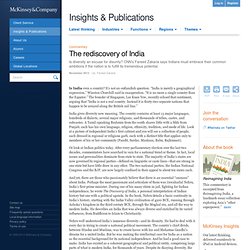
It’s not an outlandish question. “India is merely a geographical expression,” Winston Churchill said in exasperation. “It is no more a single country than the Equator.” The founder of Singapore, Lee Kuan Yew, recently echoed that sentiment, arguing that “India is not a real country. Instead it is thirty-two separate nations that happen to be arrayed along the British rail line.” How to win at leapfrog. There’s a general tendency in life to want to do what others have done.
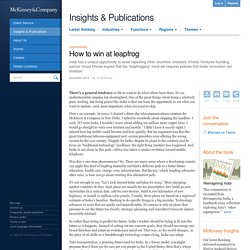
It’s an understandable impulse but shortsighted. One of the great things about being a relatively poor, trailing, but rising power like India is that you have the opportunity to see what you want to imitate—and, more important, what you want to skip. Here’s an example. In 2000, I chaired a three-day telecommunications seminar for McKinsey & Company in New Delhi. I talked to everybody about skipping the landline. The rediscovery of India. Is India even a country?
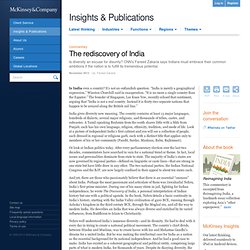
It’s not an outlandish question. “India is merely a geographical expression,” Winston Churchill said in exasperation. “It is no more a single country than the Equator.” The founder of Singapore, Lee Kuan Yew, recently echoed that sentiment, arguing that “India is not a real country. Instead it is thirty-two separate nations that happen to be arrayed along the British rail line.” India gives diversity new meaning. Or look at Indian politics today. How to win at leapfrog. India emerges most attractive investment destination: EY. PTI Nov 25, 2013, 06.52AM IST (The global survey of EY has…) NEW DELHI: With relaxation in FDI norms to boost investor sentiments, India has emerged as the most attractive investment destination surpassing neighbouring China and the US, says a report.
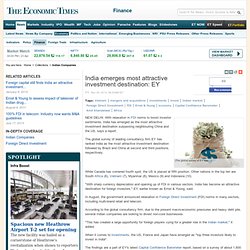
The global survey of leading consultancy firm EY has ranked India as the most attractive investment destination followed by Brazil and China at second and third positions, respectively. While Canada has cornered fourth spot, the US is placed at fifth position. Other nations in the top ten are South Africa (6), Vietnam (7), Myanmar (8), Mexico (9) and Indonesia (10). "With sharp currency depreciation and opening up of FDI in various sectors, India has become an attractive destination for foreign investors," EY, earlier known as Ernst & Young, said.
In August, the government announced relaxation in Foreign Direct Investment (FDI) norms in many sectors, including multi-brand retail and telecom. How to win at leapfrog. Getting Real With Hanoi. As India receives the general secretary of the Communist Party of Vietnam, Nguyen Phu Trong, Delhi must seek a bold expansion of the strategic partnership with Hanoi.
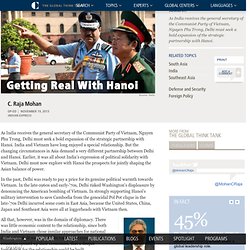
India and Vietnam have long enjoyed a special relationship. But the changing circumstances in Asia demand a very different partnership between Delhi and Hanoi. India emerges most attractive investment destination: EY. The rediscovery of India. Is India even a country?
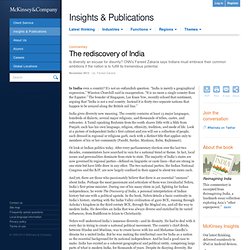
It’s not an outlandish question. “India is merely a geographical expression,” Winston Churchill said in exasperation. “It is no more a single country than the Equator.” The founder of Singapore, Lee Kuan Yew, recently echoed that sentiment, arguing that “India is not a real country. Instead it is thirty-two separate nations that happen to be arrayed along the British rail line.” India gives diversity new meaning. Or look at Indian politics today. And yet, there are those who passionately believe that there is an essential “oneness” about India. Global Swing States: Deepening Partnerships with India and Indonesia. Ted Osius Drawing lessons from a decade of partnership-building with India and Indonesia—Asia’s most populous democracies—this essay examines ways to deepen those partnerships and describes their importance to the U.S.
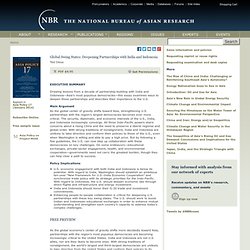
Main Argument As the global center of gravity shifts toward Asia, strengthening U.S. partnerships with the region’s largest democracies becomes ever more critical. The security, diplomatic, and economic interests of the U.S., India, and Indonesia increasingly converge. All three Indo-Pacific powers share concerns about a rising China and the need to preserve a liberal regional and global order. Policy Implications U.S. economic engagement with both India and Indonesia is below its potential. How to win at leapfrog. Why Indian 2014 Elections Matter. India's Cyber Security Challenges. Publisher: Institute for Defence Studies and Analyses ISBN: 81-86019-98-7 Price: 125/- [Download E-Book] [] About the Task Force Report Cyberspace as an independent theatre of war is about attacks that compromise the capability to use these facilities: they cannot be prevented by the security services in isolation.
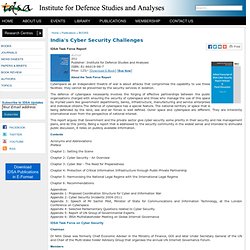
The defence of cyberspace necessarily involves the forging of effective partnerships between the public organisations charged with ensuring the security of cyberspace and those who manage the use of this space by myriad users like government departments, banks, infrastructure, manufacturing and service enterprises and individual citizens.The defence of cyberspace has a special feature. The national territory or space that is being defended by the land, sea and air forces is well defined.
Journal of Defence Studies, Vol. 6, No. 4, 2012. Global Swing States: Deepening Partnerships with India and Indonesia. Ted Osius Drawing lessons from a decade of partnership-building with India and Indonesia—Asia’s most populous democracies—this essay examines ways to deepen those partnerships and describes their importance to the U.S.
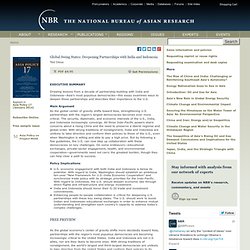
Main Argument As the global center of gravity shifts toward Asia, strengthening U.S. partnerships with the region’s largest democracies becomes ever more critical. The security, diplomatic, and economic interests of the U.S., India, and Indonesia increasingly converge. Do I Need an Aadhaar Card? - India Real Time. Public Private Partnership in India,India -A Fast Growing Free Market Democracy. Only Public-Private and people's partnership can hold sinking healthcare in India: Dr Syeda Hameed - Health.
Speaking with Zee Media's #BBV, Dr.

Syeda Hameed proposed the enforcement of Public-Private and people's partnership in India to fight against the burden of diseases and severe lack of infrastructure. India’s Gross Development Product (GDP) spend on health care has improved post National Rural Health Mission (NRHM), said Dr. Syeda Hameed. The Planning Commission member was speaking with Zee Media anchor Romana Khan in Bharat Bhagya Vidhata’s ‘Ek Naari Aisi Bhi’. Dr Hameed said perception about health had changed thanks to the NHRM given its success. Despite serious infrastructure gaps, India has achieved significant milestones in public healthcare, claimed Hameed. More institutions are being established across the country. “We have more number of hospitals and medical colleges now,” added Dr. Concurring with Hameed on poor health infrastructure, Dr. Not surprisingly, there is always a shortage of skilled health personnel.
Taking a different stand, Dr. India needs to create 15 mn jobs annually: Sam Pitroda. Reuters New Delhi: India needs to create 15 million jobs every year, the National Innovation Council Chairman Sam Pitroda said today. “We have about 550 million youths under 25 years of age and considering this, we also need to create 15 million jobs annually,” Pitroda said at a FICCI event on next generation entrepreneurs here. Pitroda, who is also the adviser to the Prime Minister on public information infrastructure and innovations, added there is an urgent need to step up the entrepreneurial spirit in the country, especially among the youth. “We need to re-create the entrepreneurial vigour so that we can ensure those 15 million jobs every year because if we do not have entrepreneurs, innovation will be difficult,” he said. Committed to unfettered growth of Internet, says Sibal. The Internet is the most ‘inclusive, transformative force’ ever discovered in the civilised world, which has done away with ‘borders and sovereignty,’ and India is committed to unfettered growth of the medium.
Minister for Communication and Information Technology Kapil Sibal made this point at the Big Tent Activate Summit here hosted by Google on Thursday to discuss the impact of the Internet on economy, politics, culture and society in the country. Google has been organising such events to debate issues related to the Internet and society around the world. Microsoft Word - Well Being in India_Article_for printing.doc - Well Being in India_Article.pdf. Foreign investors are pulling money out of India's state-controlled metals and mining firms. Foreign investors are divesting from India’s state-controlled enterprises taking their holdings to a three-year low as the country increasingly utilize these entities to stimulate the economy through below market pricing and other interventions. National Knowledge Commission. The Emerging Strategic Triangle in Indo-Pacific Asia. For China’s new premier Li Keqiang, the choice of India for his first foreign trip was a smart one.
Li went to New Delhi amid a public outcry in India over the territorial spat with China, and then visited Pakistan at a time when a new government was preparing to take office. India's Feeble Foreign Policy. For the last decade, few trends have captured the world’s attention as much as the so-called rise of the rest, the spectacular economic and political emergence of powers such as China and India. Particularly in the United States, India watchers point to the country’s large and rapidly expanding economy, its huge population, and its nuclear weapons as signs of its imminent greatness. Other observers fret about the pace of India’s rise, asking whether New Delhi is living up to its potential, whether the country’s shoddy infrastructure will hold it back, and whether it is strong enough to counter an increasingly ambitious China. All of this frenzied discussion, however, overlooks a simple fact: within India itself, the foreign policy elite shies away from any talk of the country’s rising status.
India's strategic culture is plain to see. SPEAKING FREELYIndia's strategic culture is plain to see By Namrata Goswami Speaking Freely is an Asia Times Online feature that allows guest writers to have their say. Please click here if you are interested in contributing.